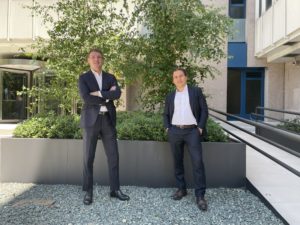We continue the series of interviews with leading references from the world of entrepreneurship. On this occasion we spoke with Scale Gas, a company that develops small and medium scale LNG and renewable gas infrastructures.
Álvaro Delicado and Miguel Ángel Castro, its founders, tell us about the beginnings of their project and how, despite being a young company, they have already achieved important successes in these first years of life.

When I was at Enagás, we had already been wanting to develop new small-scale services at the regasification terminals for months, and also to promote new uses such as LNG bunkering or land transport.
Some time later, projects such as the CORE LNGas hive project began to be promoted within the company. We were aware that the market was maturing and we saw business opportunities in the small and medium-scale LNG sector.
In 2015, the first Ingenia Business awards were held, organized by Enagás, an initiative to promote the culture of innovation and entrepreneurship among its professionals. It was there that we submitted our idea.
Although there is still much to do, we are very pleased with how Scale Gas has been evolving. We have achieved very important milestones such as the construction of two LNG supply vessels for bunkering or the first 700 bar hydrogen plant in Spain, among others. And all this thanks to a team of nine people, primed for the future and unwavering in its goal of attracting new projects.
We have achieved very important milestones such as the construction of two LNG supply vessels for bunkering and the first 700 bar hydrogen plant in Spain
Gas infrastructures are essential for diversification and security of supply and now, with the geopolitical situation we are experiencing, they are more necessary than ever.
In our case, one of our business lines is the use of liquefied natural gas as a fuel in maritime and heavy-duty long-distance road transport, which allows diversification in segments of the transport sector that are very difficult to decarbonize, as well as a significant elimination of polluting gases and reduction of CO2 emissions. In the short term, the additional use of biomethane in these segments helps to build a carbon neutral energy solution with a mature and realistic technology. In the medium and long term, hydrogen will be able to close the loop and build a zero-emission solution.
In addition, Spain is one of the countries with the most regasification plants in Europe, so these new LNG infrastructures will enable the use of these plants and help Spain to remain a leader in the LNG sector.
Currently, natural gas and LNG are in a very mature state in the traditional markets, electricity, industry and conventional. We believe that natural gas (in all its forms) will be a relevant fuel in the decarbonization process of certain segments where other alternatives are not viable, such as maritime and heavy long-distance road transport, as it allows a reduction of up to 25% in CO2 emissions compared to other fuels. It should be noted that this is an option that is currently available, since there is a developed value chain (production, transportation, storage and distribution) as well as a technology for its consumption. Although we also know that we need to monitor and improve some factors such as methane emissions, whose reduction is one of the goals we have within the development of our projects.
We believe that natural gas will be relevant in the decarbonization process
In our experience, the most important thing is perseverance and surrounding yourself with a good team. During the process the experiences are somewhat more amplified: the successes are more gratifying but the failures are more intense, so, in addition to perseverance, you need enthusiasm and help to get up and continue.
Clearly in a very positive way, and we are currently seeing it throughout society. Many of the projects related to the ecological transition come from the hand of entrepreneurship, both inside and outside the companies themselves. For example, Enagás promotes various projects that encourage decarbonization through Enagás Emprende, its Corporate Entrepreneurship and Open Innovation programme. In the case of Scale Gas, we have counted on its support since the beginning of the project.